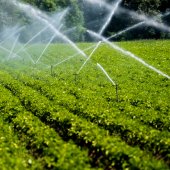The Department of Civil, Environmental, and Geospacial Engineering are involved in a wide variety of research groups and programs. Please reach out to the content researchers below the descriptions if you have any questions about a particular project.

CaRC Lab
Computing and Robotic Construction Lab
The CaRC Lab advances the digital transformation of the construction industry by adopting automated technologies such as artificial intelligence (AI), robotics, and digital twinning.
Contact: Bo Xiao

Food, Energy, and Water Consuption (FEWCON)
Changes in household-level actions in the U.S. have the potential to reduce rates of greenhouse gas (GHG) emissions and climate change by reducing consumption of food, energy and water (FEW). This project identifies potential interventions for reducing household FEW consumption, tests options in participating households in suburban communities, and collects data to develop new environmental impact models. We also identify household consumption behavior and cost-effective interventions to reduce FEW resource use.
Contact: David Watkins

Global and Community Engagement Conference
The Global and Community Engagement Conference is a dialogue and celebration of our efforts to solve issues that confront communities in need. The Michigan Tech campus hosts this annual conference every fall to give a platform to the voices of those serving communities both domestically and abroad. This event highlights voices from all backgrounds—faculty, staff, students, and local organizations—who are making a difference in communities worldwide.
Contact: Pavlis Honors College

Keenum Research Group
Bacteria, archaea, and viruses are all around us in natural and built environments. Microbes have the ability to make us sick (pathogens) , but also have the ability to be systematically harnessed for a productive output (bio-manufacturing and wastewater treatment). We are interested in the study of complex microbial communities and how they function together, how genes transfer within them, and how we can manipulate them. We use culture and molecular methods to understand these communities and how we can leverage them.
Contact: Ishi Keenum

Michigan’s Local Technical Assistance Program
The Michigan Local Technical Assistance Program (LTAP) provides the transportation technology (T2) to local government organizations (counties, cities, and villages) throughout the state. The LTAP mission is to bridge the gap between research and practice by conducting training sessions and demonstrations, and by serving as a clearinghouse for information related to state-of-the-art technology in the construction and maintenance of roads and bridges.
Contact: Center for Technology & Training

Minkata Research Group
Dr. Minakata's group aims to develop and manage sustainable technologies for water and wastewater treatment and energy harvesting.
- Development of assessing and predicting tools for water treatment technologies
- Innovative water/wastewater treatment technologies for energy saving and harvesting
- Systems approach and integrated understanding of water/wastewater reuse
Contact: Daisuke Minkata

Pavement Design with Recycled Rubber: A Toolkit
Learn how to introduce Ground Tire Rubber (GTR, or recycled rubber) into pavement design for rubber asphalt roads. Design your pavement based on road condition and daily traffic. Get a treatment recommendation.
Contact: Zhanping You

Rail Transportation Program
The Rail Transportation Program at Michigan Tech is an interdisciplinary program in railroad engineering and urban rail transit that provides opportunities for our students and faculty to participate in the development and operation of rail transportation for the 21st century.
Contact: Pasi Lautala

Roadsoft
Roadsoft is a roadway asset management system for collecting, storing, and analyzing data associated with transportation infrastructure. The software is maintained by a team of software engineers and civil engineers at the Center for Technology & Training (CTT).
Contact: Center for Technology & Training

Tran's Lab @ MTU
My research lab integrates various disciplines and concentrates on creating novel non-invasive methods for use in civil and biomedical fields.
- Non-contact Ultrasound for Concrete Set Time and Decision Making of Construction Activities
- Pressure Sensing Using Focused Ultrasound and Microbubbles
- Quantitative Ultrasound for Tissue Characterization
- Crack Detection Using Multi-transducer Ultrasonic Array
- 3D Damage Quantification Using Computer Vision and Deep Learning
Contact: Quang Ngoc Vinh Tran

Xue's Numerical Modeling Lab
My research is focused on the development and application of numerical models to problems in the coastal ocean and the Great Lakes. A key component of my current research is to establish an integrated modeling system for the Great Lakes.
Contact: Pengfei Xue